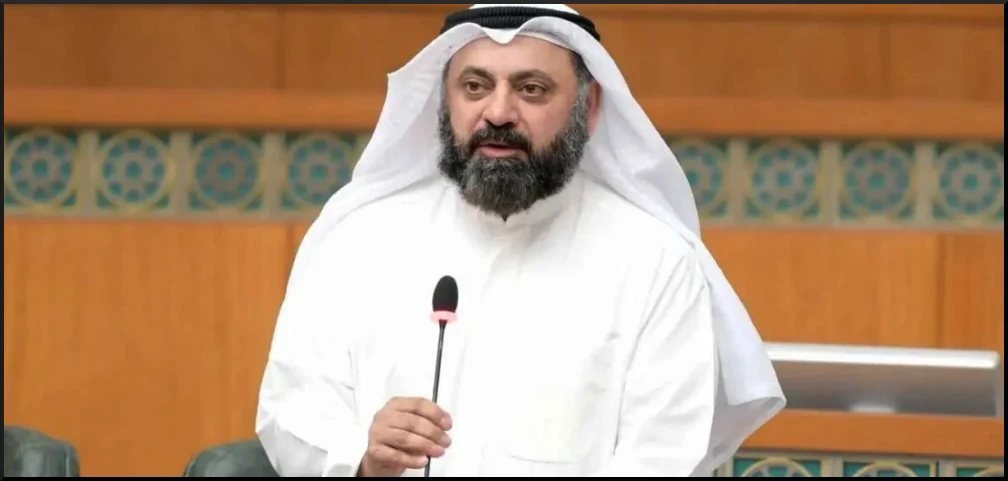by Steven Sahiounie, published on Mideast Discourse, May 18, 2024
Dr. Waleed al-Tabtabai, a former Kuwaiti member of the National Assembly, and a man integrally involved in the fundraising of the Radical Islamic terrorists who invaded Syria and killed thousands of unarmed civilians, was arrested by Kuwaiti authorities on May 12, after he posted on his X account, formerly Twitter. In the post, al-Tabtabai accused unnamed countries of interfering in Kuwait’s internal affairs, calling this “unacceptable” and expressed hope that the National Assembly would be reinstated “with all its constitutional powers”.
Experts suspect al-Tabtabai was referring to Saudi Arabia and the UAE, who have both cracked down on the Muslim Brotherhood in an effort to reform their countries into places of peace and prosperity.
On Sunday, Kuwait’s public prosecution issued a statement saying it had ordered the arrest of one person and the detention of others, on the grounds that they had posted “expressions” on their X accounts “containing attacks on the rights and authority” of Kuwait’s emir.
Al-Tabtabai obtained a PhD in Islamic studies from Al-Azhar University, and was an assistant professor at Kuwait University before being elected to the National Assembly in 1996.
Kuwait is in a process of reform, and purging the National Assembly of Muslim Brotherhood influence and domination. Egypt and Tunisia both threw off their “Arab Spring” cloak of Muslim Brotherhood domination which had been imposed on them by President Barak Obama, to benefit American and Israeli interests.
During the US-NATO attack on Syria for regime change, Kuwaiti MPs, as well as Salafi clerics were funding and exporting armed terrorists, who they referred to as “jihadis”.
The Kuwaiti ruling family did not publicly support the funding of terrorists in Syria beginning in 2011, but instead turned a blind eye to the operation to overthrow the Damascus government, which was unsuccessful.
Kuwait had been a constitutional monarchy with a parliamentary system. The National Assembly consists of 50 elected members who represent different constituencies across the country. The Emir holds extensive powers, including the ability to dissolve the National Assembly, dismiss the Prime Minister, and issue decrees. The ruling Al-Sabah family has been in power for centuries, and this has led to criticism of limited political reforms.
Emir of Kuwait, Sheikh Mishal Al Ahmed Al Sabah, said on May 11 he would suspend the parliament for up to four years, declaring that he had made the move “to save the country”.
“Unfortunately, we have faced some unimaginable, unbearable difficulties and impediments,” the 83-year-old said on Friday, according to the state news agency, a reference to the gridlock that has held back Kuwait’s development.
“We were left with no option other than taking this hard decision to rescue the country and protect its higher national interests and resources of the nation,” said Sheikh Mishal, and he added, “I will not allow that democracy will be exploited to destroy the state.”
The leader of Kuwait was wrestling with the ever present gridlock in the National Assembly due to the overwhelming chaos produced by its’ members following the Muslim Brotherhood, which stands on the same political platform as ISIS, Al Qeada, and other such terrorist groups cut from the same cloth.
Al-Tabtabai is a follower of Radical Islam, which is a political ideology, and is not a religion or a sect. He is one of the chief supporters of funding the terrorist groups in Syria.
Kuwait, one of the few semi-democratic countries in the Middle East, and the parliament had only been in existence for one month, having been elected in April 2024, with opposition MPs gaining the majority of the seats. It had not even met yet before the Emir’s dissolution decree.
 Al-Tabtabai has been convicted of numerous crimes in the past, but while serving in the National Assembly enjoyed immunity. In December 2019, the former Emir of Kuwait pardoned him of past crimes. Now, with a new leader on the throne since December 12, 2023, al-Tabtabai has been arrested, and will face the full wrath of the law.
Al-Tabtabai has been convicted of numerous crimes in the past, but while serving in the National Assembly enjoyed immunity. In December 2019, the former Emir of Kuwait pardoned him of past crimes. Now, with a new leader on the throne since December 12, 2023, al-Tabtabai has been arrested, and will face the full wrath of the law.
His arrest is not just the downfall of one man, but is a collective punishment of all the Muslim Brotherhood followers in Kuwait in the National Assembly or clerics, who have prevented the Kuwaiti government from necessary reforms to promote the peace and prosperity of all citizens.
The Muslim Brotherhood threat to Kuwait
Although, Kuwait has among the largest oil reserves in the world, it lags far behind the dramatic pace of development as compared to its neighbors Saudi Arabia and UAE.
 According to Hussain Abdul-Hussain, a research fellow at the Foundation for Defense of Democracies (FDD), all Arab countries that witnessed change between 2004 and 2011 saw Islamists climb the ladder of democratic election to take over government. In Kuwait a hybrid system emerged that allowed for a free press and the democratic election of the National Assembly, but kept the last word for the Emir. Kuwait came close to being a constitutional monarchy.
According to Hussain Abdul-Hussain, a research fellow at the Foundation for Defense of Democracies (FDD), all Arab countries that witnessed change between 2004 and 2011 saw Islamists climb the ladder of democratic election to take over government. In Kuwait a hybrid system emerged that allowed for a free press and the democratic election of the National Assembly, but kept the last word for the Emir. Kuwait came close to being a constitutional monarchy.
Every time Kuwait elected its representatives and formed a cabinet, the gridlock returned. With a population of a million or so, it was expected to compete with Dubai and Abu Dhabi in terms of growth and attraction. Yet, the democratic gridlock inhibited growth, and the once-shiny Kuwait City became shabby and backward compared with its oil-rich peers.
One of the main problems of the Kuwaiti democracy was its Muslim Brotherhood, whose lawmakers undermined the government at every turn. Democracy had become synonymous with Islamist tyranny, where elections are held routinely, but the rule of law is always absent.
Al-Tabtabai the fundraiser
 Since 2011, al-Tabtabai and other Kuwaitis were donating millions of dollars to fund the terrorists in Syria, who were not only targeting the government, but who were killing unarmed Syrian civilians in their homes and in the streets. The monies were flown from Kuwait to Turkey and Jordan, where the cash was distributed to the various terrorist groups.
Since 2011, al-Tabtabai and other Kuwaitis were donating millions of dollars to fund the terrorists in Syria, who were not only targeting the government, but who were killing unarmed Syrian civilians in their homes and in the streets. The monies were flown from Kuwait to Turkey and Jordan, where the cash was distributed to the various terrorist groups.
Because Kuwait has been a US ally for decades, it was compliant with a directive from the Obama Oval Office to support the US-NATO attack on Syria.
The US, UK, France, Turkey and Jordan set up the “Friends of Syria” group which allowed for donations outside the official channels to supply funds and supplies to the terrorists. Kuwait, Saudi Arabia and Qatar were among the biggest supporters of the US-NATO project, which supported Jabhat al-Nusra, Ahrar al-Sham, Jaysh al-Islam, and Al Qaeda.
In 2014, the Kuwaiti role involved not only creating military operation rooms and directing the course of certain battles, but also giving direct orders to commit massacres and then boasting about them.
Al-Tabtabai in Syria with the terrorists
 Al-Tabtabai is known as the director of the siege and massacre of Nubl and al-Zahraa. He made sure that the aid collected in Kuwait reached the terrorists either in the form of cash to cover the fighters’ salaries, or in the form of arms shipments, by numerous personal visits to Syria. One of his visits to Idlib lasted four months during which he participated in planning some attacks on civilians. Today, Idlib is the last terrorist controlled area in Syria, and is commanded by Mohammed al-Julani, formerly of ISIS, Al-Qaeda, Jibhat al-Nusra and currently the head of Hayat Tahrir al-Sham. The US, UK and the UN continue to supply Idlib with truck-loads of humanitarian aid which first passes through the hands of Julani and his militia.
Al-Tabtabai is known as the director of the siege and massacre of Nubl and al-Zahraa. He made sure that the aid collected in Kuwait reached the terrorists either in the form of cash to cover the fighters’ salaries, or in the form of arms shipments, by numerous personal visits to Syria. One of his visits to Idlib lasted four months during which he participated in planning some attacks on civilians. Today, Idlib is the last terrorist controlled area in Syria, and is commanded by Mohammed al-Julani, formerly of ISIS, Al-Qaeda, Jibhat al-Nusra and currently the head of Hayat Tahrir al-Sham. The US, UK and the UN continue to supply Idlib with truck-loads of humanitarian aid which first passes through the hands of Julani and his militia.
In September 2013, al-Tabtabai appeared in a video clip on Youtube during his participation in preparing and launching Grad missiles at Latakia, west of Idlib. The terrorists thanked al-Tabtabai for his support during the siege imposed on the two towns of Nubl and al-Zahraa in the Aleppo countryside. Those villages were populated by civilians who were Shite Muslims. The massacre of men, women and children carried out over months of attacks by the al-Tabtabai supported terrorists were purely sectarian in nature, and had no military objective of bringing down the Syrian government.
In June 2013, a massacre was committed in the village of Hatla in Deir al-Zour’s countryside in which 60 victims were killed. People were killed with Kuwaiti knives and purely for sectarian reasons. Just like al-Nusra Front boasted at the time that it “cleansed Hatla of the Shia,” Kuwaiti Sheikh Shafi al-Ajami boasted of “slaughtering Shias with knives” amidst cheers and cries of “God is great.”
 Saudi, Qatari and Kuwaiti media outlets celebrated the massacre each in its own way. When a journalist from Asia News Agency asked Ajami a few days later “if he feared that the Kuwaiti authorities might arrest him,” he replied: “This is an issue that concerns me and the Kuwaiti authorities,” who did not lift a finger.
Saudi, Qatari and Kuwaiti media outlets celebrated the massacre each in its own way. When a journalist from Asia News Agency asked Ajami a few days later “if he feared that the Kuwaiti authorities might arrest him,” he replied: “This is an issue that concerns me and the Kuwaiti authorities,” who did not lift a finger.
The Council of Supporters, of Kuwait, was behind the creation of the Damascus operations room in September 2013. It included Jaysh al-Islam, al-Furqan Brigades, al-Habib al-Mustafa Brigades, the Islamic Ahrar al-Sham Movement, the Companions Brigades and Battalions and the Army of the Muslims Brigade.
One Salafist group in Kuwait, the Great Kuwait Campaign, had been so successful in raising money for terrorist groups that twelve thousand terrorists were fully armed as a result of their pledges in 2013.
The campaign was publicly launched in June 2013, at the same time as the Hatla massacre, and was titled: “Kuwait’s Major Campaign to Prepare 12,000 Invaders for Syria.” The campaign collected 8.4 million Kuwait dinars (about US$ 30 million), and its main promoter was al-Tabtabai.
In June 2013, al-Tabtabai was working alongside a terrorist group in Syria’s Aleppo that gathered and trained armed men to fight in Syria. Tabtabai spoke to al-Jazeera TV and said it was the final day of training for more than 3,000 armed men who have newly arrived in Aleppo. He said another 1,000 militants will be “graduated” in northwestern city of Idlib the following day. Al-Tabtabai said they had promised the Syria militants to train 12,000 terrorists to send to Syria.
Hypocrisy
On January 28, 2019 a Kuwaiti court sentenced al-Tabtabai to seven years in jail for failing to tell his wife he divorced her and continuing to have sexual relations with her. She only found out about the divorce when he refused to support his newborn daughter. Regardless of his pious Islamic reputation, he broke Islamic law by having relations with a woman outside of marriage, and forced his ex-wife to also commit a sin, unknowingly, for his pleasure. At the time, he was outside Kuwait and already facing a 42-month jail term handed down in July 2018 in another case for storming parliament and assaulting police.
Kuwait Reforms
Kuwait has been actively pursuing major developments and reforms to diversify its economy and revamp its infrastructure.
Kuwait’s Vision 2035 has taken center stage, aiming to transform the nation into a regional powerhouse by diversifying its economy, reducing reliance on oil revenues, and increasing private sector participation. The government is actively working to attract foreign investment, foster innovation, and enhance the ease of doing business.
Kuwait is steadfast in improving its infrastructure and enhancing connectivity to position itself as a business and tourism hub. Remarkable advancements have been made in renewable energy sources, with the country aiming to produce 15% of its electricity from renewables by 2030.
In Syria, where the Kuwaitis helped to destroy the country and infrastructure, currently the people have only three hours of electricity per day.
Kuwait deeply values its cultural heritage and is investing in the revival and preservation of its historical sites and landmarks, such as the UNESCO World Heritage Site nominations for Failaka Island and the city of Al-Jahra.
In Aleppo, Syria, according to the UN, the oldest continuously inhabited city on earth, the Kuwaitis participated in the wholesale destruction of antiquities far surpassing anything that Kuwait has.
Kuwait’s new initiatives aim to promote artists, galleries, museums and cultural centers to boost tourism.
Before the Syrian war began in 2011, in which the Kuwaitis participated, Syria was voted as the safest tourist destination in the Mediterranean region by the French Association of Tourist Agents in their annual conference.
Kuwait now wants to increase women’s participation in the workforce, while in Syria women have full rights the same as men in the civil code, and are doctors, lawyers, judges, and a past Speaker of the Syrian Parliament was a woman.
 Syria Support Movement solidarity with the Syrian people
Syria Support Movement solidarity with the Syrian people





